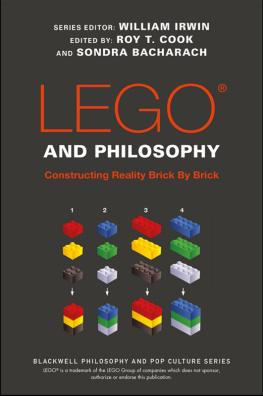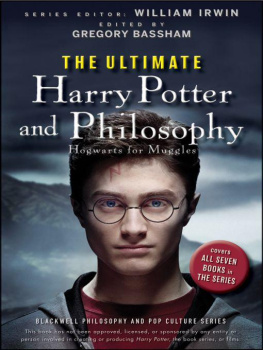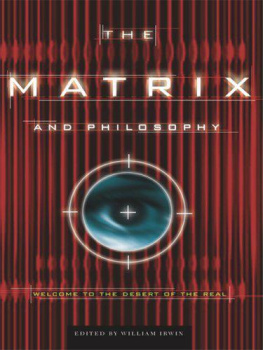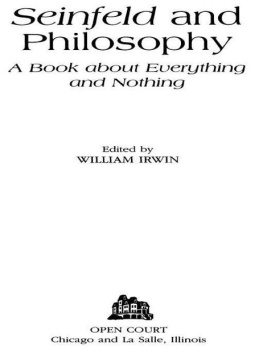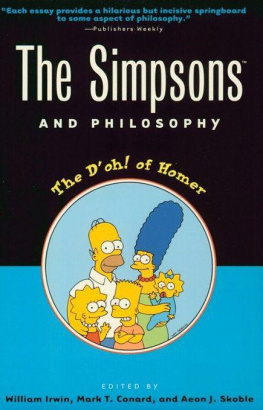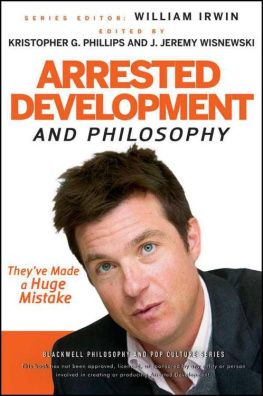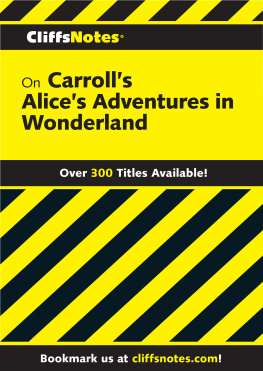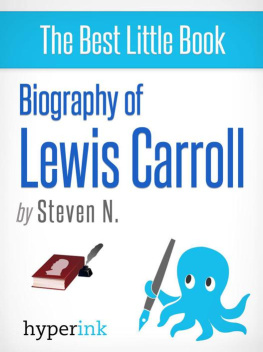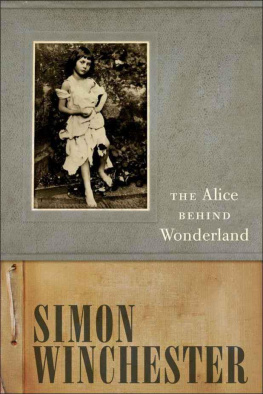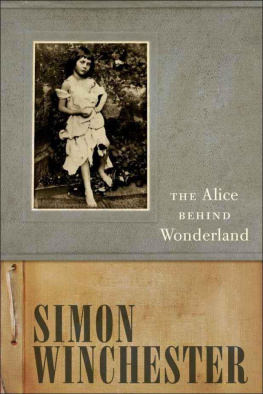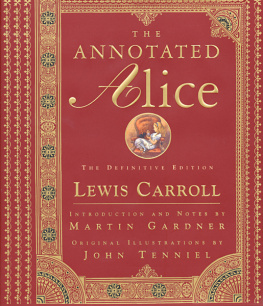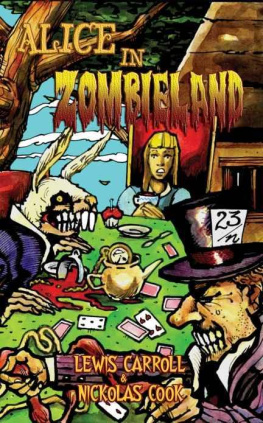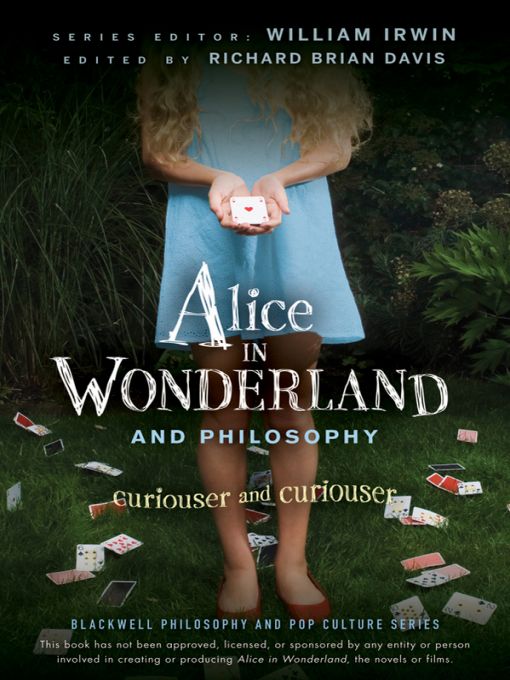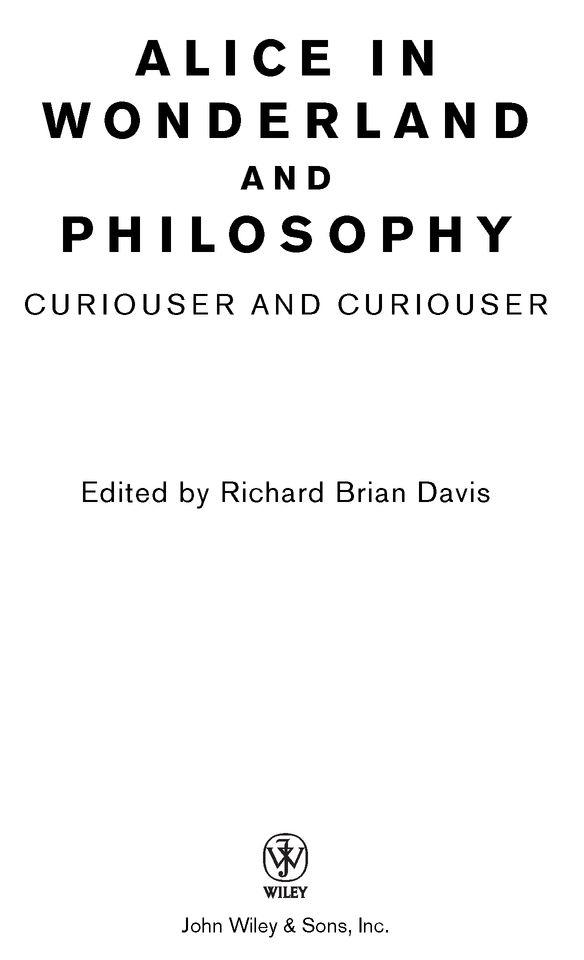Table of Contents
The Blackwell Philosophy and Pop Culture Series
Series Editor: William Irwin
South Park and Philosophy Edited by Robert Arp
Metallica and Philosophy Edited by William Irwin
Family Guy and Philosophy Edited by J. Jeremy Wisnewski
The Daily Show and Philosophy Edited by Jason Holt
Lost and Philosophy Edited by Sharon Kaye
24 and Philosophy Edited by Richard Davis, Jennifer Hart Weed, and Ronald Weed
Battlestar Galactica and Philosophy Edited by Jason T. Eberl
The Office and Philosophy Edited by J. Jeremy Wisnewski
Batman and Philosophy Edited by Mark D. White and Robert Arp
House and Philosophy Edited by Henry Jacoby
Watchmen and Philosophy Edited by Mark D. White
X-Men and Philosophy Edited by Rebecca Housel and J. Jeremy Wisnewski
Terminator and Philosophy Edited by Richard Brown and Kevin Decker
Heroes and Philosophy Edited by David Kyle Johnson
Twilight and Philosophy Edited by Rebecca Housel and J. Jeremy Wisnewski
Final Fantasy and Philosophy Edited by Jason P. Blahuta and Michel S. Beaulieu
ACKNOWLEDGMENTS
Its My Own InventionYeah, Right!
Oh, Ive had such a curious dream. Since it seems as though Ive just edited a book, Id better single out a few individuals for special praise. Thanks are due to Connie Santisteban at Wiley, who was no doubt tempted (at points) to speak the dreaded words of the White Rabbit: Oh my ears and whiskers, how late its getting! She didnt. And to Bill Irwin, who pushed meor rather let me jumpinto the rabbit hole. Working with Bill is sweet: a sort of mixed flavour of cherry-tart, custard, pineapple, roast turkey, toffee, and hot buttered toast. And finally, to my daughters, Madelyn and Emma, who urged me on at every turn. My wish for you is that you would grow up to be (in Megan Lloyds words) as unflappable, confident, assertive as Alice herself. To Madelyn and Emma Davis, I dedicate this book.
INTRODUCTION
You re Late for a Very Important Date
You take the blue pill, Morpheus says to Neo in The Matrix, and the story ends.... You take the red pill and you stay in Wonderland, and I show you how deep the rabbit-hole goes. Its a tempting offer, isnt it? For at one time or another in our lives, weve all wanted to escapefrom a dull and tedious job, an impossible relationship, from a world in which we often have so little control over what happens to us. Perhaps its for reasons such as these that our culture has become positively obsessed with the idea of transcending the confines of this world for the cool fresh air of another. Whether its by a red pill, a secret wardrobe, a looking glass, or a rabbit-hole, it doesnt really matter. Well take it.
Of course, we don t just want to know how deep the rabbit-hole goes. Thats a given; after all, it s a portal to another worldfour thousand miles down, I think. We also want to know how to make sense of what we discover when we suddenly land thump! thump! in Wonderland and pass through the looking glass. And Alices Wonderland is an oh! so curious place filled with both dangers and delights. Here we encounter blue caterpillars who smoke hookahs, babies who turn into pigs, cats whose grins remain after their heads have faded away, and a Mad Hatter who speaks to Time. There is a White Queen who lives backward and remembers forward, and there are trials in which the sentence is handed down first with the evidence and verdict given out only afterward. And youd better be on your best behavior while there. As the Red Queen sees it, beheading is a punishment that fits every crime!
Weve spoken of Wonderlands dangers, but what of its delights? Why should anyone want to travel to such a world? As Cheshire Puss tells Alice, you must be mad or you wouldnt have come here. Is Wonderland simply a land of sheer nonsense, or is there a method to Lewis Carrolls madness? Well, as the Duchess wisely observes, Everythings got a moral, if only you can find it. And the moral of the book you now hold in your hands is that there are deep philosophical riches to be had in Alices Adventures in Wonderland and Through the Looking-Glass, answers to lifes ultimate questions, if only you have the proper guide.
You dont have to be blue, a caterpillar, or under the effects of the hookah to ask a deep question like Who in the world am I? As Alice says, Thats the great puzzle! Indeed it is. How can I know whether this or that job is right for me, if I dont know who me is? Indeed, how can I know what I can become in the future? (Hardly any of us, I dare say, is satisfied with who we are at present.) And to know the answers to these questions, I must know who I have been. I must remember. But thats often my problem: I forget. What to do? What to do? The Alice-addicted philosophers in this book will clear the air of the hookah smoke and forward you the decryption codes for unlocking your personal identity. And youll be glad they did.
As you read on, youll be amazed to discover why nice girls dont make history (and Alice is better than any Disney princess); what the Red Queen can teach us about nuclear strategy; whether we should do more with mushrooms than just eat them (and what sort of trip to expect if we do); and how Alice, procrastination, and the Spice Girls are all mysteriously connected. What a curious feeling! You can put it all together for the first time. So Read Me. Venture to taste this book, and if finding it very nice, we recommend that you very soon finish it off.
PART ONE
WAKE UP, ALICE DEAR
Chapter 1
UNRULY ALICE: A FEMINIST VIEW OF SOME ADVENTURES IN WONDERLAND
Megan S. Lloyd
Come to class ready to discuss and defend your favorite fairy-tale heroine, I told my students in Unruly Women through the Ages. The course began as a survey of feminist archetypes and issues, but it quickly became a forum for a group of rather unruly female students aged eighteen to twenty-two to discuss candidly topics such as date rape, abortion, sexual harassment, battered women, male and female relationships, anorexia and bulimia, and what it means to be a woman today. For one class period, we turned to the realm of fairy tales. To my initial question, I expected students to write about Little Red Riding Hood or Goldilocks, but most students chose a Disney princessCinderella, Ariel, Belle, Mulan, mostly unruly females going against the flow of male rules imposed upon them. Two students, however, chose Alice as their favorite unruly fairy tale character. They argued that Alice, unlike other fairy-tale heroines, requires no fairy god-mother, huntsman, or good fairyjust her own wits and ingenuityto navigate through Wonderland successfully, keeping her head intact. My students know Alice not through Carroll but through Disney, and this Disney heroine Alice is a precursor to the strong Belle and Mulan and counter to the pliable Cinderella and the passive Aurora and Snow White, who require male aid to bring them to life and reality again.
In Carrolls or Disneys version, Alices journey through Wonderland has long been seen as a tale of identity, agency, and adulthood. The curiosity and confidence that Carroll instills in Alice connect her with other unruly women we studied in class, such as Lysistrata, Shakespeares Kate, Emma Bovary, Marie Antoinette, Marilyn Monroe, Hillary Clinton, Sarah Palin, Camille Paglia, Pandora, and Eve. Alices direct, candid approach to life is refreshing and something the young women in my class can relate to. They understand the story of a young woman who has the world before her, ready to embark on life, who changes herself, primarily by eating and drinking, to fit in. She encounters all types, tests herself, tastes life around her, and once she learns the right combination to fit in and be comfortable with herself, shes welcomed into a beautiful world where she possesses wisdom, power, and prestige.


